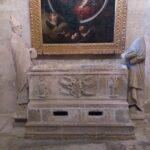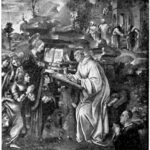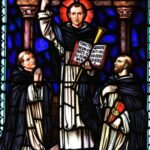St. Charles Borromeo
St. Charles Borromeo
St. Charles Borromeo: A Legacy of Faith and Resilience
When they lived:
St. Charles Borromeo, a remarkable figure in the history of Catholicism, lived during the late 16th century. He was born on October 2, 1538, in the magnificent Castle of Arona, located on the shores of Lake Maggiore in Italy. His life spanned a tumultuous period of great change and challenges, yet he managed to leave an enduring impact on the world.
Where they lived:
St. Charles Borromeo hailed from the Lombardy region in northern Italy, where he spent a significant part of his life. His family estate, the Castle of Arona, offered breathtaking views of the lake and the surrounding countryside. However, he later moved to Milan, one of the most influential cities of the time, where his legacy as an archbishop was etched into the history books.
Notable world events during the time of their life:
- The Council of Trent (1545-1563): This ecumenical council, called by the Catholic Church to address the challenges posed by the Protestant Reformation, had a profound impact on the course of Christianity. St. Charles Borromeo played a pivotal role in implementing its reforms and revitalizing the faith in the face of the challenges posed by the Protestant movement.
- The Age of Exploration (late 15th to early 17th century): While St. Charles Borromeo focused on matters of faith and ecclesiastical affairs, the world around him was experiencing an era of exploration and discovery. Adventurous explorers like Christopher Columbus, Vasco da Gama, and Ferdinand Magellan were charting new territories and linking continents, transforming the world’s understanding of geography and trade.
- Galileo Galilei’s Scientific Discoveries (1564-1642): A few decades after St. Charles Borromeo’s passing, the brilliant scientist Galileo Galilei would revolutionize astronomy with his groundbreaking discoveries, such as the observation of Jupiter’s moons and his support for the heliocentric model of the solar system. These advancements laid the foundation for modern science and challenged prevailing beliefs.
- The French Wars of Religion (1562-1598): During St. Charles Borromeo’s lifetime, France was torn apart by religious conflicts between Catholics and Protestants. The wars and massacres during this period had a significant impact on European politics and the religious landscape.
- The Great Plague of Milan (1576-1578): In 1576, Milan was struck by a devastating outbreak of the bubonic plague. Thousands of lives were lost, and fear gripped the city. St. Charles Borromeo fearlessly led relief efforts, ministering to the sick, and providing aid to those in need, earning him a reputation as a compassionate and dedicated servant of God.
Their patronage:
St. Charles Borromeo is revered as the patron saint of catechists and seminarians due to his relentless efforts to reform and improve the education and training of clergy during the Counter-Reformation. Additionally, he is also the patron saint of learning and study, reflecting his commitment to intellectual pursuits and theological scholarship.
In conclusion, St. Charles Borromeo’s life intersected with a dynamic period in history, marked by religious upheavals, scientific progress, and societal challenges. His dedication to the Catholic faith, coupled with his tireless service to the people of Milan during the plague, exemplifies the enduring impact of his legacy. As we reflect on his life, we are reminded of the importance of faith, resilience, and compassion in the face of adversity.
Despising riches for Christ
St. Charles Borromeo was born on October 2, 1538, at the Arona castle on Lake Maggiore near Milan, Italy. His father was the Count of Arona, and his mother was a member of the Medici House. He was the third of six children born to the couple.
Charles’ rich parents gave him a good education. With all the riches they had, he could have done anything. However, Charles wanted to become a priest. When he was 12 years old, the young Charles dedicated himself to a life of service to the church. Even as a young boy, he lived with integrity. He told his father that he could only keep the money intended for his studies and that the rest belonged to the poor.
Charles went to the University of Pavia, where he learned Latin. His father passed away in 1554, so the responsibility for his household fell to him. This responsibility resulted in financial difficulties, and he earned a reputation for being short of funds. Despite this, he continued his studies and earned a doctorate in civil and canon law.
A Young Ecclesiastical Leader
Cardinal Giovanni Angelo Medici, Charles’ uncle, became Pope Pius IV on December 25, 1559. The new pope summoned his nephew to Rome and appointed him a cardinal-deacon. He worked as an assistant and adviser to his uncle, and after a month, the pope made him a cardinal. As a cardinal, Charles held more responsibilities, which included the government of the Papal State and the supervision of the Knights of Malta, the Carmelites, and the Franciscans.
In 1560, Pope Pius IV named Charles as the administrator of Milan. He founded a college and carried out his duties well. Eventually, with the conviction that he was called by the Lord to the priesthood, Charles was ordained first to the order of deacon. Then, on September 4, 1563, he was ordained to the priesthood, and on December 7, he was consecrated as bishop. He was appointed Archbishop of Milan on May 12, 1564.
Leading the Reform in Milan
During that time, the church had many flaws and troubles. Many of the priests had forgotten Jesus and His words “to serve and not to be served”. They refused to help the poor. They did not feed the hungry. They did not accompany the lonely, and they neglected the homeless. So, seeing all of these, Archbishop Borromeo taught them how. He sent priests back to school by establishing seminaries. He was very concerned with how religious education was taught to children. He even wrote a catechism for the young and built schools for them. He worked tirelessly for the reform of the church in Milan.
A True Pastor Amid the Plague
Sickness came to Milan in the form of the bubonic plague in 1576. To worsen things, famine also broke out throughout the area. During the height of the plague, civil authorities fled, while Archbishop Borromeo stayed in the city. He rushed from house to house, fed the hungry, helped those in need, ministered to the sick and dying, and buried the dead. He put the gospel of God’s love into action.
His unceasing work and the burdens of his office began to affect Archbishop Borromeo’s health. In 1854, he himself got sick and died at the age of 46. He had spent his life showing his flock what the love of God looks like.
Finally, in 1584, Charles himself got sick and died. He was only 46 years old. He had spent his life showing people what God’s love looks like. He was canonized in 1610 by Pope Paul V. His feast day is November 4.
Five Interesting Facts About St. Charles Borromeo
- St. Charles Borromeo is the patron saint of bishops, cardinals, seminarians, and spiritual leaders.
- When St. Charles Borromeo was young, he suffered from a speech impediment that made him appear slow to those who did not know him. However, he performed well and impressed his teachers.
- St. Charles Borromeo was a member of the Third Order of Franciscans. He was also the Cardinal Protector of the Friars Minor.
- In 1569, an attempt was made on St. Charles Borromeo’s life. A bullet struck him as he was kneeling in prayer, but he was miraculously preserved from harm.
- St. Charles Borromeo’s emblem is the word humilitas (humility) crowned, which is a portion of his coat of arms.
Prayer to St. Charles Borromeo
Preserve in the midst of your people,we ask, O Lord, the spirit with which you filled the Bishop Saint Charles Borromeo,that your Church may be constantly renewed and, by conforming herself to the likeness of Christ,may show his face to the world. Who lives and reigns with you in the unity of the Holy Spirit,one God, for ever and ever. Amen.



